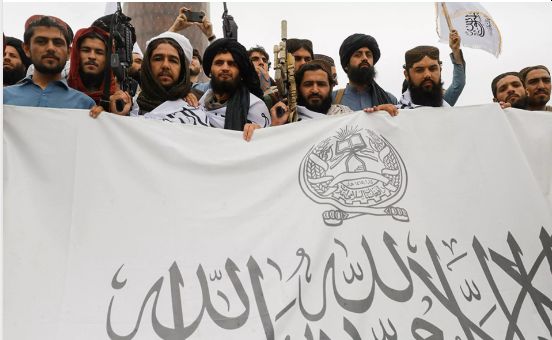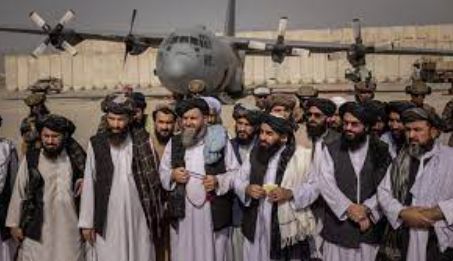By Eric Vandenbroeck and co-workers
Why Afghanistan Still Poses A Threat To
The Region And Beyond
It has been two years since the Taliban retook control of
Afghanistan. But earlier this summer, in a government office in Kabul
overlooking a well-tended garden, a mid-level Taliban official lamented that
the country remains locked in a political standoff. Regional and Western actors
cannot agree on how to deal with the Taliban, he complained; even after the
withdrawal of all foreign troops from Afghanistan, the West is still fighting a
culture war. The United States and its allies want the Taliban to lift their
restrictions on women’s rights, but the Taliban will not accept what they see
as a feminist agenda.
Meanwhile,
governments from Beijing to Washington have demanded that the Taliban form an
inclusive government. At peace talks in Doha before August 2021, Taliban
representatives offered to share power with opposing Afghan factions to end the
conflict. But since winning the war, they
have reserved the right to exclude politicians not in the Taliban from the
cabinet. Taliban leaders complain that “inclusivity” is little more than a
vague talking point that could mean anything from broader participation in
governance (which they are willing to consider, at least for men) to inclusion
of political figures from the defeated government (which they are not).
And so Afghanistan
remains at an impasse, with no realistic pathway for the government to shake
off its pariah status, escape sanctions, and take a seat at the United Nations.
The Taliban refuse compromises that undermine their standing with core
supporters and, in their view, corrupt their moral values. For their part,
Western officials argue that it would be against their values and politically
damaging to accredit diplomats from a regime that so flagrantly discriminates
against women. Even sending a U.S. envoy to Kabul remains controversial in
Washington, and the Biden administration has refrained from doing
so. Formal diplomatic recognition of the Taliban could take years if it
ever happens.
The World Has No Choice But to Work With the Taliban
These years cannot be
wasted. Sanctions, asset freezes, and other economic restrictions that isolate
Afghanistan have crippled its chances of recovering from a financial crisis
that the United Nations has called the world’s largest humanitarian disaster
for the last two years. Banking, aviation, and other critical sectors are
hobbled. More than half the country’s people cannot satisfy basic household
needs. Pledges of humanitarian aid have fallen as donors turn away.
For millions of
Afghans, regional actors, Western governments, and institutions must work to
establish more functional relationships with the Taliban. After spending
several months in Afghanistan speaking to Taliban officials and the foreign
dignitaries who negotiate with them, we concluded that, even though
Afghanistan’s reentry into the community of nations remains a distant prospect,
there are substantial practical steps that the outside world can take in the
service of peace, stability, and security.
For Afghanistan, the
return of the Taliban marked the beginning of a deeply illiberal regime that is
particularly hostile to
women and minorities.
The swiftness of the Taliban takeover confounded more optimistic US and UK predictions about the
survival of the Afghan government. But most of its consequences were entirely
predictable and indeed predicted – from the worsening human rights situation to an economic crisis.
Diplomats should move
quickly to break the current paralysis. The situation reminded the Taliban
Foreign Ministry staffer of a local parable about a cow and its butchers: “The
butchers disagree about how to carve up the animal. They bicker for so long
that the cow dies of old age, and nobody gets to eat.”
Good Defenses Make Good Neighbors
The Taliban regime
may be a pariah government, but Afghanistan does not exist in isolation. It
anchors a region with neighbors who badly need it to recover; if Afghans
continue to suffer, so will millions of others nearby. The Taliban are trying
to cement their power with displays of state building: they have been improving
dams around the country, flying drones over water projects, and filling social
media with the footage of their works in progress. Whatever the world thinks,
the Taliban now run a country with aims and urgent needs.
Afghanistan’s region
cannot wait in a holding pattern for the world to strike a grand bargain with
the Taliban on diplomatic recognition. Most of Afghanistan’s neighbors
wanted the departure of foreign troops and were pleased when the U.S.
withdrawal ended an extraordinarily deadly war. But now that American forces
are no longer combating transnational militants in the region, Afghanistan’s
neighbors worry the Taliban cannot, or will not, fill the gap.
China, for its part,
wants the Taliban to hand over Uyghur militants based in Afghanistan. Still,
the Taliban have adopted a softer policy of resettling them far from the
Afghan-Chinese border. Central Asian countries have similar security concerns
and get identical responses. Pakistan, which has supported the Taliban since
the group’s inception in the 1990s, wants Kabul to crack down on the
Tehreek-e-Taliban Pakistan (TTP), a jihadi group intermittently at war with
Islamabad since 2007. The TTP has a presence in Afghanistan, although Taliban
denials and TPP-related incidents in Pakistan have increased since mid-2021,
resulting in three times as many fatalities as in the two years before the
Taliban’s takeover of Kabul.
Also profoundly
troubling for most neighbors and Western countries is the ongoing
presence in Afghanistan of the Islamic State Khorasan Province, an affiliate of
the group known as ISIS. Taliban security forces have become adept at killing
ISKP leaders, sometimes with the apparent assistance of foreign intelligence
agencies. But the Taliban have been unable to subdue the group entirely, and
neighboring states remain worried that ISKP could still use Afghanistan as a
base to threaten other countries. Information-sharing remains limited because
the Taliban have not established much trust with regional and international
security agencies.
Part of the problem
lies with the Taliban: they deny that some militant threats exist. Meanwhile,
other regional governments—Russia, especially—stoke paranoia among the Taliban by
absurdly claiming that the United States backs ISKP and other militant groups.
But it does not help that UN monitoring teams, which used to visit Afghanistan
to research and publish analyses of terrorist threats, have not returned since
the Taliban takeover.
Those monitors are
unlikely to return any time soon because they accept information only from UN
member states—and the Taliban do not sit in Afghanistan’s UN seat. But in the
meantime, other multilateral forums could serve as a stopgap. Afghanistan has
observer status at the Shanghai Cooperation Organization, founded by China and
Russia in 2001, and includes all of Afghanistan’s neighbors. The Taliban want
to join its discussions about security.
The Shanghai Cooperation
Organization appears reluctant to welcome the Taliban, and authorities in Kabul
might have to settle for the kind of regional meetings hosted by Uzbekistan in
recent years. But regardless of the forum, the countries surrounding
Afghanistan must sit down with the Taliban and discuss their mutual security
needs. Kabul has legitimate concerns about anti-Taliban militants sneaking
across its borders, and its neighbors need to prevent illegal immigrants,
drugs, guns, and jihadis from crossing into their territory from Afghanistan.
These practical
conversations seem unlikely to harden the Taliban’s stances on big issues that
foreign governments care about—and they would have many possible benefits.
Regional security forums could push the Taliban toward regularizing border
management or at least keeping their fighters away from the edges of
neighboring countries unless they are uniformed guards. The Taliban might
accept help professionalizing their border forces with better training and
equipment, and they and their neighbors could install new technologies for
border screening and customs integration together. Neighboring countries might
also agree to give back Afghan aircraft stranded in their territory since 2021.
Under Pressure
All the security
interventions in the world cannot improve the lives of Afghans or their
neighbors without economic improvements. Here, too, many possible
collaborations do not entail formal diplomatic recognition. The Taliban want
their highways—and, eventually, railways—to serve as trading connections with
South Asia—Kabul dreams of electrical corridors and gas pipelines linking the
region. But as the world heats up, the most urgent regional cooperation efforts
should focus on water management.

Afghanistan is mostly
upstream from neighboring countries but has fewer dams and irrigation systems.
Decades of war have smashed infrastructure and stalled development. Climate
change is exacerbating flooding and droughts. The Taliban’s flagship water
project is a new canal system in the north called Qosh
Tepa, which would divert water from the Amu Darya, a large river, for irrigation.
The Taliban’s desire
to manage water resources is understandable and necessary, but they are plowing
ahead without regard for their neighbors. The Amu Darya also irrigates vast
swaths of Turkmenistan and Uzbekistan, and officials in those countries worry
about their cotton fields and their exports withering. For its part, Tehran
complains that the Taliban are taking too much water from the Helmand and other
rivers that flow into Iran.
Disagreements over
water rights have almost undoubtedly contributed to deadly clashes
between Taliban and Iranian security forces. Coordination and investment
by both Afghanistan and Iran are necessary not only to forestall violent
conflict over water; both countries also need it to grow. Iran cannot afford to
let its rivers dry up, and business in landlocked Afghanistan cannot flourish
without access to Iranian ports such as Chabahar, which could be threatened if
border tensions escalate.

A blueprint for better
cooperation already exists in the form of a 1973 water treaty between the two
countries, which guaranteed Iran fixed amounts of water. Negotiations at the
time included discussions about increasing Afghan trade through Iranian
seaports. That treaty was never implemented because of political upheaval in
both countries, but the old deal could serve as the basis for today’s
negotiations. New infrastructure is also required to measure river flows and,
especially, to use water more efficiently.
Iran and Afghanistan
could achieve such climate adaptations themselves. But they are saddled with
foreign sanctions, and the barriers to securing expertise and funding for such
ventures are multiplied. Getting help from organizations such as the World Bank
is not only a matter of technical assistance; it could help with the politics
of water.

A cautionary tale of
what happens if the Taliban are left to their own devices is unfolding on Afghanistan’s
northern border. Uzbekistan has offered technical support for the Qosh Tepa project to help the Taliban avoid the risk of
routing a river into an improperly engineered trench. Still, the Taliban have
resisted what they see as foreign meddling in their flagship project. The
neighbors have leverage—Afghanistan imports most of its electricity from
Central Asia—but their bilateral outreach to the Taliban on water issues has
not worked so far.
Still, there is room
for agreements or tacit understandings that address the concerns of the Taliban
and other countries. The Taliban could make deals in multilateral discussions
on watershed management and climate adaptation. For example, the hosts of the
COP28 climate summit, which starts in November, could invite the Taliban to
attend. The United Arab Emirates, the event organizers, will need to weigh the
opprobrium that hangs over the Taliban against the much more significant
benefit of including all regimes in talks about how to survive a worsening
climate.
Baby Steps Are Major Steps
These regional,
piecemeal solutions might provide international actors with a template for how
to deal with the Taliban in the short term. More than a few Western leaders
want to forget Afghanistan. Ignoring the country allows them to avoid the
shameful topic of a lost war. Some prominent voices, including in these pages, are demanding that more pressure be put on the
Taliban and holding out hope for regime change, although the Taliban show no
signs of collapse.
Others may nurture a
hope that undermining the Afghan regime will leave a mess on the doorsteps of
China, Iran, and Russia. And others who want to negotiate a better future for
ordinary Afghans, especially women, and girls, may believe that withholding
money and help will give them leverage if and when negotiations begin over the
normalization of diplomatic relations. When formal negotiations begin, this
theory goes, Western officials could use promises of future support to extract
concessions from the Taliban—although, in the past, the Taliban have rarely
been swayed by such incentives.
But there are more
ways to support Afghanistan than many acknowledge. And regional solutions often
need international backing, whether a Western government’s OK to send equipment
for Taliban border guards or a yes vote from the World Bank to proceed with
water infrastructure projects. Financing through the Global Environment
Facility, the Green Climate Fund, and the Adaptation Fund could substantially
help defray infrastructure costs. Still, Afghanistan’s access to these funds
has been suspended since the Taliban’s takeover.

Regional diplomats
are trying to deal with the Taliban on security, economic, and environmental
concerns. But an official at an understaffed embassy in Kabul admitted that the
to-do list feels daunting. Day-to-day engagement with the Taliban now mainly
falls to officials like him, who draw on limited budgets that do not match the
size of the problems. Western sanctions also constrain local actions. For
instance, it is hard for regional governments or private investors to get loans
to build infrastructure in Afghanistan; grants from international donors are
used to provide much of the financing for such projects.
And many of the problems
facing Kabul—for example, its lack of budgeting, banking, and
development-strategy expertise—are the kind of development challenges typically
financed by Western countries. But Western donors are withholding development
assistance and offering less humanitarian aid, which has fallen to about 25
percent of last year’s humanitarian funding in 2023. “If your engagement is
mostly based on humanitarian assistance and that assistance is declining, then
your ‘engagement strategy’ is a disengagement strategy,” a Western official in
Kabul told us.
Afghanistan’s
economic and security troubles cannot be ignored indefinitely, not least
because the people who suffer most from instability and deprivation are often
women and girls. The neighborhood cannot simply “stop and wait,” a regional
diplomat told us. He said that regional actors “on the frontlines” need
international backing.
Two years after the
Taliban’s ascent to power, it is worth listening to the nearby countries that
now spend substantially more time talking to Kabul’s new leadership than do
Western diplomats and who have the most to lose if the country crumbles. They
are saying that the world cannot let Afghanistan become a failed state and that
global isolation will only make the Taliban more challenging to work with.
Pursuing and
supporting regional cooperation does not mean giving up hope for talks between
the Taliban and the world about achieving recognition. Diplomats must keep
chipping away at the challenging positions that block progress toward full normalization.
One modest step forward occurred earlier this year in Doha when UN
Secretary-General António Guterres convened a meeting of international envoys
to Afghanistan.
The envoys agreed
that the conditions were not right to recognize the Taliban—even if they did
not spell out the requirements. But in his public comments, Guterres concluded
that such gatherings should continue to fight terrorism and drug trafficking
and promote inclusivity and women’s rights. And earlier this year, the UN
Security Council mandated an independent review of all international
engagement with Afghanistan; that report will be delivered in November.
In many ways, Western
countries remain Afghanistan’s gatekeepers. Someday, a Taliban regime that
respects human rights might be fully welcomed into the club of nations. That
day, however, is distant. The West cannot stand around and wait for the cow to
die. The region is struggling, and both Afghans and their neighbors deserve to
eat.
For updates click hompage here